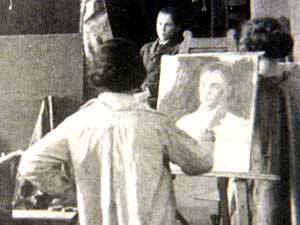|
Audio
Photos
Resources
|
January 5, 2005
 |
| An art class in Whitby Hall during the 1920s. (Photo courtesy of the College of St. Catherine) |
St. Paul, Minn. — It must've seemed a little odd that late December day in 1904, a couple dozen nuns in black habits trudging through a snowstorm, fighting a biting wind.
"As the story had it, they took the streetcar down Grand Ave. as far as it would go, to Cleveland," says St. Catherine's 10th president, Sister Andrea Lee, "and then walked the mile from Grand to Cleveland and Randolph, and then up the hill to Derham Hall."
One hundred years later, Sister Andrea relates the story from her Derham Hall office.
She says the women who started St. Kate's, the sisters of St. Joseph of Carondelet, had worked hard to raise the tens of thousands of dollars to get the college started, including peddling the St. Paul Archbishop's book -- "The Church and Modern Society" -- door-to-door. Nothing would keep them from the college's opening day on Jan. 5, 1905.
Sister Andrea says the sisters' pioneering spirit and determination have resonated with the St. Kate's community throughout the last 100 years.
"There's a wonderful quote that we've used over and over in the centennial year," Lee says. "'The soul of a pioneer woman is a beautiful thing,' in terms of her willingness to break new ground, take risks, seek adventure and to do things that hadn't been done before."
For the college's founders, educating women was surely something rarely done.
"As for training young ladies through a long intellectual course, as we do young men, it can never be done," said a local minister quoted in 1905 -- who typified the prevailing view of sending girls off to college.
"They will die in the process. The poor thing has her brain crowded with history, grammar, arithmetic, geography, chemistry... Metaphysics, French, often German, Latin, perhaps Greek... She must be on the strain all the school hours, study in the evening till her eyes ache, her brain whirls, her spine yields and gives way, and she comes through the process of education enervated, feeble, without courage or vigor, elasticity or strength," said the pastor.
Boy, was he wrong. The college began with seven students and has grown to become the largest Catholic women's college in the country with 4,800 students.
Sister Mary William Brady graduated from St. Catherine's in 1932. She also taught at the college and was its president in the late 1950s. Now 98, Sister Mary spends her days at the Bethany Home next door to campus.
She says St. Catherine's growth and staying power is based on a simple principle and vision shared by the sisters of St. Joseph -- that women are important.
"The Sisters of St. Joseph have taken it upon themselves to prepare hundreds of women," she says. "There are hundreds of them in all kinds of work. Women can do things which men cannot do. So the Sisters of St. Joseph are contributing tremendous value to society. Maybe society doesn't know it, but that's the truth."
Notable St. Kate's alumni include U.S. Rep. Betty McCollum, former state finance commissioner Pam Wheelock, several judges, and 1959 Wimbledon doubles champion Jeanne Arth.
Hillary Spreizer, 19, is a sophomore who came to St. Kate's from Rapid City, South Dakota, for its political science department. She says the college has exceeded her expectations. She says the style of learning at the college is women-centered, including more discussion and collaboration.
"When you are in that environment, and you get to know women a lot more, it's this whole other resource that as a woman, I wasn't even aware of," Spreizer says. "I wasn't aware of being able to learn in a whole different setting. And that's really valuable. And I take that confidence from the classroom out into the real world. And I wouldn't necessarily receive that in a co-ed environment."
Many St. Kate students agree. They say there's less competition in a single-sex school, and they feel more confident speaking their mind.
The students, faculty and staff, and the Sisters of St. Joseph, active and retired, will be celebrating St. Kate's centennial with special events throughout 2005.







